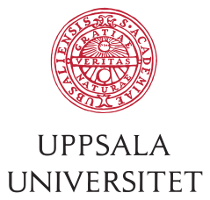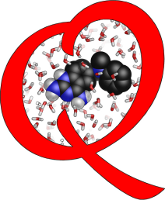Introduction
Molecular dynamics (MD) simulation can be used to sample the thermally accessible region of conformational space of a microscopic model of a molecular system. From the ensemble of sampled structures and their associated potential energies (given by the force field or molecular mechanics potential energy function) it is, in principle, possible to calculate free energies. Quantities such as binding free energies, solvation free energies and activation free energies are particularly interesting to calculate because they are the direct result of thermodynamic or kinetic experiments. It is thus possible both to quantitatively verify calculated results against experimental data and to make predictions which can be tested experimentally. Q is a set of tools for such calculations, tailored for some specific kinds of free energy calculations, namely:
- (I) Free energy perturbation (FEP) simulations.
- (II) Empirical valence bond (EVB) calculations of reaction free energies.
- (III) Linear interaction energy (LIE) calculations of receptor-ligand binding affinities.
Documentation
The Q manual is only available on-line as a PDF file.
The latest changes are briefly documented in the version history files:Evaluation Version
If you want to try Q before requesting a license, we provide an evaluation kit. The kit contains executable images for the Q programs for the Win32/Intel x86 platform (i.e. Windows95, Windows98, WindowsNT running on Pentium-like processors). The evaluation programs were built with all compiler optimizations disabled and therefore run at less than 20% of the speed of the optimized programs. Only Gromos87 force field files are included in the kit.
To get started in setting up your own test simulations, you probably want to look at the Q examples available on-line.
Obtaining the program
You can get Q from the following link:
https://github.com/esguerra/Q6Q is now under a GPL Version 2 License. This means that you can copy the code and modify it at will, but if you make any changes you should give them back to the copyright holders.
Support
We have no resources to support users of Q but of course we appreciate a dialogue with you as a user. Particularly, we are anxious to hear from you in the (hopefully unlikely?) case that you discover a bug in the program. If time permits, we may also be able to answer other questions, e. g. about using the program, simulation procedures, or compilation. If you have questions about Q regarding licenses, send these directly to Johan Åqvist ( ). Bug reports and other questions should be sent to Christoffer Lind ( ).
Q-user mailing list
The Q-users mailing list is hosted at google-groups:
To be included in the list please send a request to: qmoldyn@googlegroups.com

